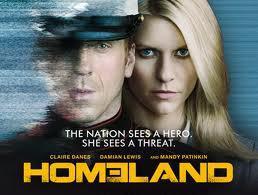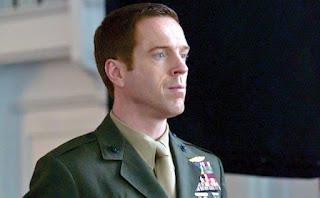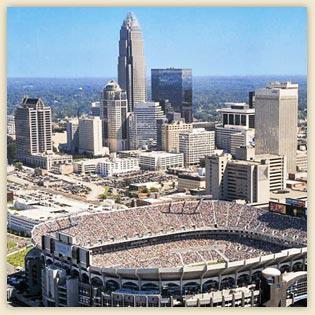 On Sunday, the critically acclaimed CIA/terrorist drama Homeland will begin its second season on Showtime. It’s a well-timed return as just this past week Homeland was the toast of television, triumphing impressively at the Primetime Emmy Awards1, winning outstanding series, lead actor (Damian Lewis), lead actress (Claire Danes), and writing, all in the drama categories. An impressive feat considering the competition included shows as lauded and accomplished as Mad Men, Breaking Bad, Game of Thrones, and Downton Abbey.
On Sunday, the critically acclaimed CIA/terrorist drama Homeland will begin its second season on Showtime. It’s a well-timed return as just this past week Homeland was the toast of television, triumphing impressively at the Primetime Emmy Awards1, winning outstanding series, lead actor (Damian Lewis), lead actress (Claire Danes), and writing, all in the drama categories. An impressive feat considering the competition included shows as lauded and accomplished as Mad Men, Breaking Bad, Game of Thrones, and Downton Abbey. For those of you who haven’t seen the first season…spoiler alert…it centers on the efforts of a rebellious CIA officer, Carrie Matheson (Danes), investigating a rescued American POW, Sgt. Nicholas Brody (Lewis), just returned from Afghanistan after eight years in captivity. She believes that Brody has been “turned” by his captors and is now a Manchurian Candidate-like Al Qaeda sleeper agent. She battles to convince her increasingly skeptical superiors of her heterodox theory while also struggling with her personal instabilities, including crippling bipolar-ism. She’s right though, Brody has been turned. We see him ping-pong between a devastated POW trying to reintegrate into his old life and a hidden terrorist planning an attack on American soil.
Danes is a superb actress and her work in Homeland is worthy of awards. For his part, Lewis does a fine job as a man torn between radically different desires. And both are supported by a strong cast, most notably Mandy Patinkin as Saul Berenson, Carrie’s CIA mentor and moral guide. The shows are well directed, the production values are high, and there’s a lot of interesting and fairly convincing through-the-looking-glass detail about terrorism and modern intelligence work. To put it simply, the show has a lot going for it. It’s already the most watched program in Showtime’s history, and with the Emmy attention and strong word-of-mouth, the second season is expected to capture the eyes of a much wider audience. But not mine.
I hereby submit that Homelandis in fact a bad show, and offer five reasons why I won’t be watching season 2.
Where’s the FBI?
The show depicts the efforts of Dane’s CIA officer and many of her colleagues to investigate, interrogate, surveil, bug the property of, and spy by various other methods on: Sgt. Brody, foreign diplomats, other American citizens, suspected terrorists, to name but a few, each one living/residing in America. The CIA may be metonymic for the entire spook community and all its covert activities, but this is not what the agency does. Investigation of suspected criminals in America is the responsibility of law enforcement agencies, not intelligence agencies. While the CIA would have an interest in suspected terrorists and terrorist organizations in the U.S., the investigations, arrests, and prosecutions would be led first and foremost by the FBI (and supported by local law enforcement and other Homeland Security agencies).
The FBI is largely absent from Homeland, and when present is shown as a hostile obstacle to Matheson and her colleagues. It’s no secret that U.S. intelligence and law enforcement agencies have struggled to get along and share information, both before and after 9/11, but what’s shown in Homelandgoes way beyond reality. And so we see CIA officers carrying guns, participating in raids on D.C. buildings, and clearly violating the civil rights of citizens and foreigners. This may be fun for the plotting and action, but it’s another glaring break between Homelandand the realism it claims to portray.2
Citizen Brody

Sgt. Nicholas Brody
One of the major plot developments through season 1 was the rise of Sgt. Brody from war hero to politician. By the end of the season Brody was on the cusp of being elected to the U.S. House of Representatives. Supposedly, his being a war hero with a great story of perseverance and survival, and having a beautiful wife and picture perfect children is enough to convince the Vice President’s Chief of Staff that he should fill a soon-to-be vacant House seat. Are we really expected to believe that this is how politics in 21st century America works? Brody is a sergeant, which means he likely doesn’t even have a college education. He’s not a lawyer or business man. He has no fortune or insider connections to the types of money and influence needed to organize a political campaign, garner needed support, develop an agenda, etc. He has no public service background3 or political experience. In other words, he’s a pure amateur without any of the advantages that amateurs need to win at the highest level of American politics.Perhaps the writers thought of John McCain when developing this plotline. He was (McCain) a POW who returned to America after a long, brutal captivity to become a famous politician and run for President. But McCain was a pilot who graduated from the Naval Academy and was the wealthy son and grandson of four star admirals. After returning from Vietnam, McCain was a naval liaison to the U.S. Senate where he gained his first entre into politics. He was politically connected as witnessed by having two U.S. Senators serve as groomsmen at his second wedding in 1980 (and he married into an even wealthier family). Brody has none of these advantages. He’s depicted in the show as suffering from post-traumatic stress disorder (PTSD) and under the thrall of Abu Nazir, a terrorist mastermind. And the way he’s selected for political office is contrived and over simple. This plotline, which is going to be a central focus of season 2, is unbelievable.
Bad Geography
Homeland is set in and around Washington, D.C. Much action takes place at CIA headquarters in Langley, Virginia, at the Brody home somewhere in suburban Virginia,4 in downtown Washington, near one of the region’s airports, at a lake house somewhere in the city’s western hinterlands, etc. Unfortunately for the show, it isn’t filmed in and around Washington. Instead, almost all of the series is filmed in and around Charlotte, NC. This was done because it’s cheaper to film in Charlotte than Washington. The problem is that Charlotte doesn’t look like Washington. Charlotte has skyscrapers, Washington doesn’t. Washington has famous landmarks and monuments, (and at the risk of offending North Carolina readers) Charlotte doesn’t. Washington has a fairly iconic and recognizable look, with its huge public buildings and their neoclassical architecture, low-rise density, abundance of aforementioned monuments, setting on the Potomac, and so forth.
Charlotte, on the other hand, is like many other burgeoning southern cities: its downtown is shimmering and spread out and tall, its density is fairly low, its streets are wide and in a grid pattern. There’s no major waterway, the topography is notably different, and so on.

Does this city look anything like Washington, D.C.?
I find these discrepancies very distracting. It’s obvious that the action of Homeland isn’t actually taking place in Washington and that detracts from the verisimilitude of the show. Consider how the spare desert setting of Albuquerque5is incorporated in Breaking Bad, how bustling Manhattan is part of Mad Men, or how the mean streets of Baltimore became a major character in The Wire. Setting matters and faking one city for another doesn’t work when the charade is apparent. If the producers wanted to substitute one city for another – a very common practice in film and TV – then they must do a better job of it. Early in season 1 we saw Brody run by the Capitol. That was effective. Why not more of these small shoots in Washington to bolster the illusion of the events actually being there? By the end of season 1 we see the Vice President nearly assassinated on a downtown street that no one could confuse for Washington, a terrorist interrogated in a high rise that exists nowhere in the Capital region, an airport that in no way resembles Dulles, Reagan, or even BWI. We even see a park that’s supposed to be the Gettysburg battlefield (it’s not). The examples go on and on and I’m sure they’ll carry right into season 2.Terrorist Brody
The central fact of Homeland is that Sgt. Nicholas Brody is a terrorist. The drama is that only his terrorist masters and a few people at the CIA know it (or think they know it). After being captured by terrorists in 2003 he is physically and psychologically tortured, even being forced to beat a friend and fellow prisoner to death. Finally, reaching his breaking point, he is offered hope. A man is kind to him, gives him food, shelter, a warm bath, and comfortable living conditions. This man is the terrorist leader Abu Nazir. He is generous and civilized towards Brody. Eventually he has Brody tutor his young son in English. Brody develops a close relationship with the boy. One day as the boy walks to school he is killed in a missile strike from an American drone. Brody is devastated by his death. An indeterminate time later, Brody is rescued from a terrorist compound by American special forces. He returns home to a hero’s welcome.
When Brody returns he displays signs of PTSD, he secretly worships as a Muslim, and he lies during his CIA debriefing (and beats the polygraph). We the audience are kept in doubt until halfway through season 1 when Brody finally meets with a diplomat working with Nazir. Not long thereafter he, seemingly devoted to Nazir, gets involved in a complicated plot to kill the Vice President. (A plot it’s worth noting doesn’t succeed.6)
Here are my problems with this portrayal:
- We’ve seen the war hero return as dangerous, if surreptitious, traitor many times before. Most notably in the Manchurian Candidate (both versions). It’s a rather far-fetched concept anyway, and in Homelandit doesn’t have the benefit of being original.
- Brody is shown as being deeply committed to the terrorist cause. He goes to great lengths to keep his true loyalties hidden. He is willing to sacrifice himself to kill Americans. He implicitly rejects the love and security of his family when he commits himself to the plot to kill the Vice President. This could happen, but the storytelling doesn’t take us there. We see Brody after he returns from Afghanistan. We see him with his wife and children. We see him receiving kindness from friends and adulation from the press and public. We as an audience don’t see why he is set on throwing all that away and killing Americans. Perhaps sensing this, one of the late season 1 episodes is devoted to showing Brody with Nazir and his son. But this peek into what happened during his captivity is overwhelmed by the bulk of the action, which takes place in present day America. We the audience are left to doubt why this American soldier would want to kill other Americans once he’s back home. This is big story hole; we’re never given enough reason to believe that Brody would behave like the terrorist we’re being shown he is.
- A major plot point is that the Vice President ordered the drone attack that resulted in the death of Abu Nazir’s son. This despite intelligence that the target of the attack was next to a school and a drone strike was likely to result in civilian casualties. Ostensibly this is given as the reason for Abu Nazir’s plot against the Vice President and Brody’s willingness to carry it out. But it raises many vexing questions: Why is the Vice President ordering CIA drone attacks? Why does the CIA listen to a Vice President who has no power to order such a strike? Why does Nazir use his best asset (Brody) to target of all people the Vice President?7
Taken individually these issues may not amount to much, but together I think they undermine much of the story. I don’t see why a man like Brody, a true-blue American, would become a terrorist and the show doesn’t do enough to convince me otherwise. Then as the terrorist plot unfolds, we’re underwhelmed by its scope and execution. And the entire American-turned-terrorist angle leads to my biggest issue with the show.
Moral Equivalence
There’s much hand-wringing within the walls of the show’s CIA, represented by Saul Berenson who’s put up as the moral center of the show, over the drone attack ordered by the Vice President. The attack is shown as deliberately indifferent to civilian life. Or to put it another way, it’s shown as a cold-blooded terrorist attack. No better in than the murders carried out by the show’s actual terrorists. There’s a term for this, it’s called moral equivalence. And ignoring all manner of nuance and the fact that real world outcomes are often far messier than the best laid plans, let me state bluntly that moral equivalence between America and terrorists is wrong.
Terrorism, the use of violence and terror as a means of coercion, is evil. America, and American power, no matter of ill-used, is not. The very fact that there is much American hand-wringing over incidents like misplaced drone strikes or, say, abuse of prisoners, is evidence that the American populace is capable of an introspection unknown among terrorists, who by their nature are fanatics. I could write a long thesis on this point, but I’ll spare you that and simply write that a show that suggests a moral equivalence between American and terrorist actions has lost the plot.8
Homeland may continue for several more seasons, but I suspect that this issues I’ve noted will hamstring, maybe even undermine the show before too long. I won’t be watching to see that unfold.
---
NOTES:
1. Not to be confused with the Daytime Emmys, Sports Emmys, News Emmys, Regional Emmys, International Emmys, etc. Television spends a lot of time praising itself.
2. This is one way that Homeland is like many of the formulaic cop and criminal shows that litter network television. In these programs (Hawaii 5-O, for just one example) the cops seem to live outside the law, get into frequent gun fights, wreak havoc in their communities, have access to fantastic technologies and virtually any information they need. It all adds up to be preposterous and unwatchable (or so you would think, but these are among the most popular programs on TV). In other words, these are silly, mindless entertainments, and the exact antithesis of what Homeland seems to aspire to be.
3. Excepting of course the sacrifice he made to go fight in Afghanistan and then survive a brutal imprisonment for eight years.
4. And it's a really convenient plot point that Brody's home is in Washington, which makes all of the plot mechanics work. As a soldier, he could have been stationed from anywhere, and it's a relatively small chance that he would live in Washington area.
5. Breaking Bad was initially going to be set in Los Angeles, but budget constraints forced the producers to move the setting to New Mexico. But relative blandness of Albuquerque, the wide desert vistas, and sunny skies serve the show very well. Neatly mirroring the bland, anonymous reputation of Walter White and his massive is still unrealized ambitions.
6. And it can’t succeed, which we know beforehand because that would mean Brody’s death and no second season.
7. The whole Vice-President-directing-covert-military-actions-while-the-President-is-absent story seems like an obvious illusion to leftists claims about the Bush (W) Presidency and the sinister presence of Dick Cheney. Though the young Vice President in Homeland is physically quite distinct from the grizzled Cheney.
8. Consider for instance that the exact same argument could be made (and has been made) about American and British saturation/fire bombing against German and Japanese cities (read civilians) during World War II compared to the Holocaust and brutal murder of millions of Chinese. No one, including this writer, will cite the massive aerial bombardments of Axis populations late in WWII as the proudest moments in the Allied war effort. But no one can make an argument that it is equivalent to the horrors – the evil – committed by the Nazis and militarized Japanese Empire.

